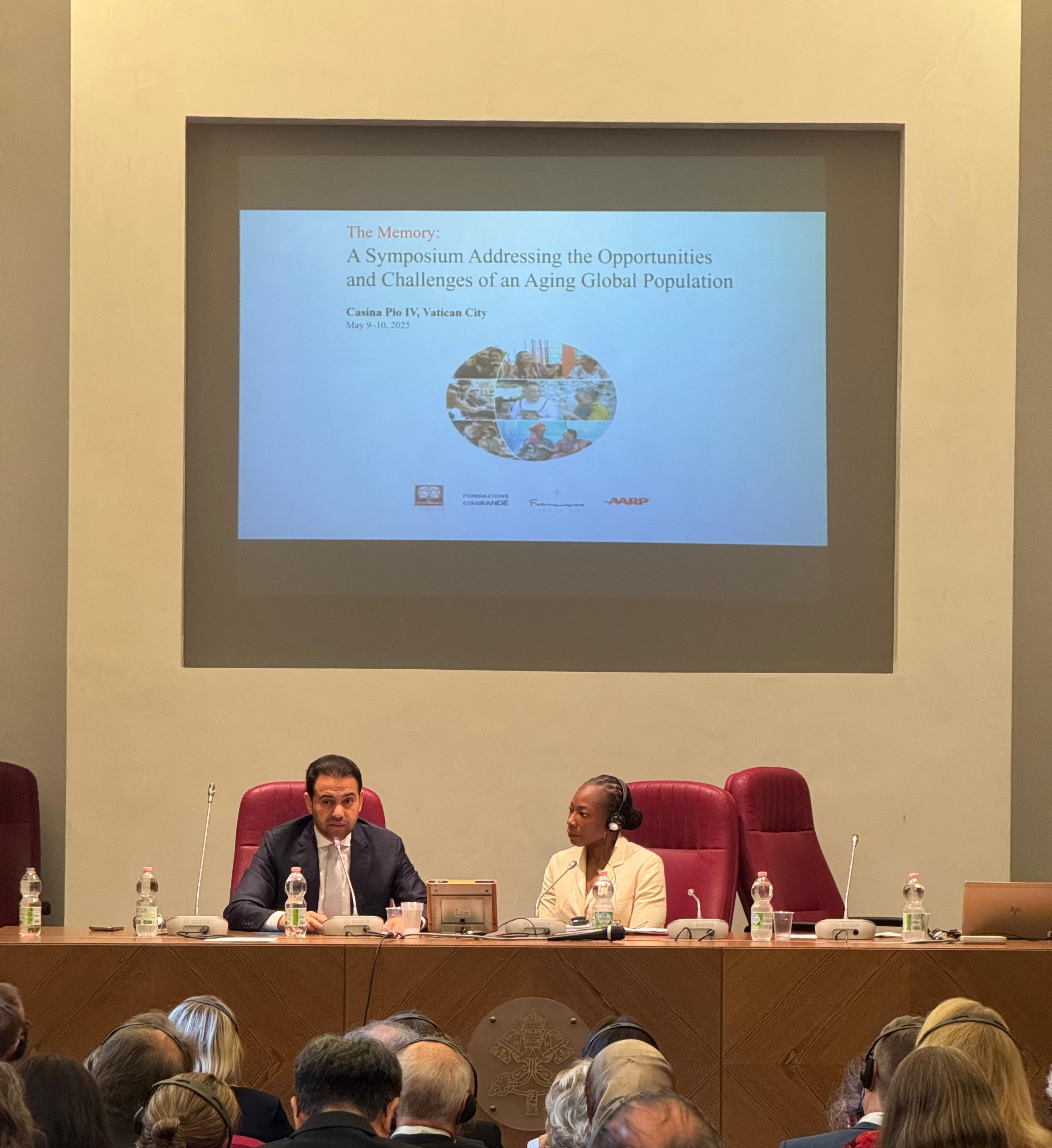Muslim Council of Elders Participates in Global Symposium Hosted by the Vatican on Memory and Its Connection to Human Dignity
In the first event hosted by the Vatican following the election of Pope Leo XIV, the Secretary-General of the Muslim Council of Elders affirms: “We are confident in the continuation of the Human Fraternity journey. Pope Francis leaves behind a lasting legacy of compassion and noble humanitarian service.”
Secretary-General: Passing on wisdom and experience across generations strengthens societal resilience and lays the foundation for a balanced future.
His Excellency Judge Mohamed Abdelsalam, Secretary-General of the Muslim Council of Elders, took part in the international symposium held at the Vatican from May 9–10, discussing the memory and its connection to human dignity—a symposium addressing the opportunities and challenges of an aging global population. The event brought together high-level officials, global thought leaders, and senior religious figures from around the world.
At the outset of his remarks during the opening session of the symposium, the Secretary-General of the Muslim Council of Elders stated:
"With deep emotion, I stand before you today, recalling that we were invited to this symposium under the patronage of His Holiness Pope Francis—whose enduring memory continues to live in the hearts of all who knew him closely. I was, with all humility, one of them. His lasting impact remains etched in the conscience of everyone who witnessed his presence, actions, and noble humanitarian stances. We saw the depth of his faith in the values of genuine human life—not a life of pretense, but one of sincerity. He embodied this faith in a remarkable way, especially in his insistence on living naturally until the very end, without medical intervention, choosing instead to depart this life with spontaneity and dignity. I extend my heartfelt congratulations to His Holiness Pope Leo XIV on his election as Pontiff of the Catholic Church. We hold firm confidence in our continued journey of dialogue and fraternity with His Holiness, in pursuit of peace. Together, we shall persist in promoting the values of love, understanding, and mutual recognition, for the sake of a better world and a future where all may enjoy security, peace, and stability."
His Excellency Judge Abdelsalam conveyed the support of His Eminence Professor Dr. Ahmed Al-Tayeb, Grand Imam of Al-Azhar and Chairman of the Muslim Council of Elders, for this significant initiative focused on protecting the dignity and well-being of the elderly. He emphasized that older adults represent the collective memory of societies—a living archive of identity, wisdom, and experience. Preserving this wisdom and transferring it across generations, the Secretary-General noted, enhances a society’s ability to withstand crises and build a stable and balanced future. He noted that recent studies show how involving the elderly in education and mentoring programs benefits not only their mental health but also offers younger generations valuable insight. Having grandparents in the household, he added, positively influences children’s health and success—a phenomenon now known academically as the “Grandmother Effect.”
His Excellency Judge Abdelsalam underscored that Islam honors human beings at every stage of life. As the Quran states: “Indeed, We have dignified the children of Adam…” (The Qur’an, 17:70). The Prophet Muhammad (peace be upon him) urged the honoring and reverence of the elderly, saying: “He is not one of us who shows no mercy to younger ones and does not acknowledge the honour due to our elders.” Adhering to such respect and veneration for older individuals is, in essence, a form of glorifying the Almighty— the Giver of life and the Source of all dignity. As the Prophet (peace be upon him) also said: “Glorifying Allah involves showing honour to a grey-haired Muslim...”
The Secretary-General further emphasized the importance of preserving this collective memory by giving special attention to the cognitive health of the elderly. He stressed the need to create environments that uphold their dignity and protect them—psychologically, economically, and physically—from neglect or discrimination. He also called for a renewed recognition of this stage of life as the crowning chapter of human experience—one that offers opportunities for continued contribution and the blessing of meaningful living.
In conclusion, His Excellency Judge Abdelsalam emphasized the importance of developing a clear and inclusive vision for elderly care—one rooted in the principles of intergenerational solidarity, justice, dignity, and respect. He affirmed that the future of our societies depends on our collective ability to address the challenges and embrace the opportunities presented by an aging population. He urged, “We must work together to build societies that preserve the place of the elderly in both our hearts and minds—societies that guarantee them a dignified life worthy of all they have given, and that care for the preservation of their memory, which is, in truth, the memory of humanity itself. This care must be grounded in clear principles: upholding their dignity, honoring their status, and treating them with kindness and compassion.”

